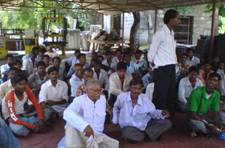|
TARA Karigar Mandal Aiming at Sustainable Skills, Livelihoods and Habitat
T he first masons’ association in Bundelkhand, TARA Karigar Mandal was launched on October 1, 2007 at TARAgram Orchha on the occasion of the World Habitat Day. It is heartening to note that 158 masons registered themselves on the very first day. There is an immediate need to strengthen the masons’ capacity to deliver habitat services efficiently and enhance their livelihoods available locally.Masons are a critical node in the delivery of habitat services in rural areas. It has been observed that rural clients proceed with construction work after consulting or taking help from the local masons. Housing construction schemes with pre-designed management and supervision systems introduced by external agencies government or non-government - often do not apply local skills and knowledge. But experience shows that rudimentary, low-quality and highly energy intensive building practices are being applied in the rural areas of Bundelkhand. There is rapid loss of traditional knowledge of practical and viable practices in masonry as well as the art of building. Also, the habitat service delivery in rural areas tends to be highly unprofessional, which ultimately negates the benefits to the masons. Further, unavailability of work in this drought-prone region results in large-scale migration of skilled and semiskilled construction workers to the cities. Development Alternatives (DA) has been facilitating and training local masons and artisans of Bundelkhand in sustainable building practices. DA conducted primary research in Bundelkhand to understand the rural house owners’ aspirations, service delivery mechanisms and the difficulties in the way to development. Similar surveys were carried out to understand the masons’ side of the story - the nature of work available to them, expectations of their clients and difficulties in meeting the same, problems of finding regular work, skill upgradation needs and limited wages. Research suggests that local masons are usually unable to deliver value for money in terms of substance and quality of construction as per the expectations of the house owners. In addition, their lack of knowledge and expertise in sustainable building practices are promoting sub-standard habitat conditions, which are unfriendly to the environment and highly capital intensive. It was realized that masons could be the ‘agents of change’ for improved rural habitat conditions, provided their basic capacities are built to meet the needs and expectations of the clients.
Since this is a community based institution, several village-level meetings with the masons were carried out to gauge their ideas about such a collective - its structure, role and operational mechanisms. Quality control, training and certification, collective negotiating power for better and sustained livelihoods and accrued social benefits for the member masons are some important areas where the association aspires to work in. It was exhilarating to see the response from villages around Orchha, Niwari and Datia where TARAgram has worked extensively with the local masons. The final two meetings had around 65 to 70 masons, each travelling from villages as far as 40 kilometers away. The enthusiasm of masons was highly encouraging when almost half of the masons present during the last meeting came forward to deposit their membership fees. The masons themselves coined the name TARA Karigar Mandal, during one of the meetings where they felt that the TARA brand would give a significant boost to the collaboration. It was agreed during the meetings that in order to ensure quality control and recognition, membership preference would be given to the trained and skilled masons with proficiency in delivery of sustainable building practices. But the association has been kept open to all, the only condition for untrained masons’ membership being that they must attain skills in sustainable building practices within six months of association with the mandaI, either through training programmes or by working with a trained mason. A basic constitution and institutional mechanism has been outlined after rigorous discussions - including the governing body - fee structure, criteria for membership, roles and responsibilities and future activities. As the TARA Karigar Mandal makes an advent, its future impact appears to be promising, with aspirations and excitement riding high among the masons. qaparna@devalt.org
|
 An
association of the agents of change seems to be the logical solution in
order to upgrade the skills as well as avail of employment
opportunities. The need to accomplish efficient delivery systems in
Bundelkhand and the DA’s endeavours at masons’ capacity building are
aiming at the formation of a masons’ guild.
An
association of the agents of change seems to be the logical solution in
order to upgrade the skills as well as avail of employment
opportunities. The need to accomplish efficient delivery systems in
Bundelkhand and the DA’s endeavours at masons’ capacity building are
aiming at the formation of a masons’ guild.